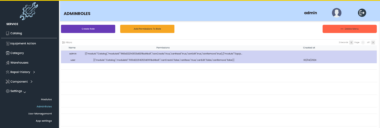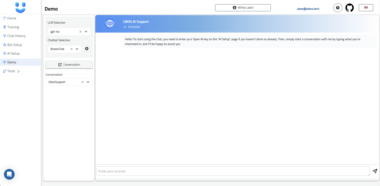 Proxmox Manager - Proxmox MCP Server
Proxmox Manager - Proxmox MCP Server
A Python-based Model Context Protocol (MCP) server for interacting with Proxmox hypervisors, providing a clean interface for managing nodes, VMs, and containers.
 Built With
Built With
- Cline - Autonomous coding agent - Go faster with Cline.
- Proxmoxer - Python wrapper for Proxmox API
- MCP SDK - Model Context Protocol SDK
- Pydantic - Data validation using Python type annotations
 Features
Features
Full integration with Cline
Built with the official MCP SDK
Secure token-based authentication with Proxmox
Tools for managing nodes and VMs
VM console command execution
Configurable logging system
Type-safe implementation with Pydantic
Rich output formatting with customizable themes
https://github.com/user-attachments/assets/1b5f42f7-85d5-4918-aca4-d38413b0e82b
 Installation
Installation
Prerequisites
- UV package manager (recommended)
- Python 3.10 or higher
- Git
- Access to a Proxmox server with API token credentials
Before starting, ensure you have:
- [ ] Proxmox server hostname or IP
- [ ] Proxmox API token (see API Token Setup)
- [ ] UV installed (
pip install uv)
Option 1: Quick Install (Recommended)
Clone and set up environment:
# Clone repository cd ~/Documents/Cline/MCP # For Cline users # OR cd your/preferred/directory # For manual installation git clone https://github.com/canvrno/ProxmoxMCP.git cd ProxmoxMCP # Create and activate virtual environment uv venv source .venv/bin/activate # Linux/macOS # OR ..venvScriptsActivate.ps1 # WindowsInstall dependencies:
# Install with development dependencies uv pip install -e ".[dev]"Create configuration:
# Create config directory and copy template mkdir -p proxmox-config cp config/config.example.json proxmox-config/config.jsonEdit
proxmox-config/config.json:{ "proxmox": { "host": "PROXMOX_HOST", # Required: Your Proxmox server address "port": 8006, # Optional: Default is 8006 "verify_ssl": false, # Optional: Set false for self-signed certs "service": "PVE" # Optional: Default is PVE }, "auth": { "user": "USER@pve", # Required: Your Proxmox username "token_name": "TOKEN_NAME", # Required: API token ID "token_value": "TOKEN_VALUE" # Required: API token value }, "logging": { "level": "INFO", # Optional: DEBUG for more detail "format": "%(asctime)s - %(name)s - %(levelname)s - %(message)s", "file": "proxmox_mcp.log" # Optional: Log to file } }
Verifying Installation
Check Python environment:
python -c "import proxmox_mcp; print('Installation OK')"Run the tests:
pytestVerify configuration:
# Linux/macOS PROXMOX_MCP_CONFIG="proxmox-config/config.json" python -m proxmox_mcp.server # Windows (PowerShell) $env:PROXMOX_MCP_CONFIG="proxmox-configconfig.json"; python -m proxmox_mcp.serverYou should see either:
- A successful connection to your Proxmox server
- Or a connection error (if Proxmox details are incorrect)
 Configuration
Configuration
Proxmox API Token Setup
- Log into your Proxmox web interface
- Navigate to Datacenter -> Permissions -> API Tokens
- Create a new API token:
- Select a user (e.g., root@pam)
- Enter a token ID (e.g., “mcp-token”)
- Uncheck “Privilege Separation” if you want full access
- Save and copy both the token ID and secret
 Running the Server
Running the Server
Development Mode
For testing and development:
# Activate virtual environment first
source .venv/bin/activate # Linux/macOS
# OR
..venvScriptsActivate.ps1 # Windows
# Run the server
python -m proxmox_mcp.server
Cline Desktop Integration
For Cline users, add this configuration to your MCP settings file (typically at ~/.config/Code/User/globalStorage/saoudrizwan.claude-dev/settings/cline_mcp_settings.json):
{
"mcpServers": {
"github.com/canvrno/ProxmoxMCP": {
"command": "/absolute/path/to/ProxmoxMCP/.venv/bin/python",
"args": ["-m", "proxmox_mcp.server"],
"cwd": "/absolute/path/to/ProxmoxMCP",
"env": {
"PYTHONPATH": "/absolute/path/to/ProxmoxMCP/src",
"PROXMOX_MCP_CONFIG": "/absolute/path/to/ProxmoxMCP/proxmox-config/config.json",
"PROXMOX_HOST": "your-proxmox-host",
"PROXMOX_USER": "username@pve",
"PROXMOX_TOKEN_NAME": "token-name",
"PROXMOX_TOKEN_VALUE": "token-value",
"PROXMOX_PORT": "8006",
"PROXMOX_VERIFY_SSL": "false",
"PROXMOX_SERVICE": "PVE",
"LOG_LEVEL": "DEBUG"
},
"disabled": false,
"autoApprove": []
}
}
}
To help generate the correct paths, you can use this command:
# This will print the MCP settings with your absolute paths filled in
python -c "import os; print(f'''{{
"mcpServers": {{
"github.com/canvrno/ProxmoxMCP": {{
"command": "{os.path.abspath('.venv/bin/python')}",
"args": ["-m", "proxmox_mcp.server"],
"cwd": "{os.getcwd()}",
"env": {{
"PYTHONPATH": "{os.path.abspath('src')}",
"PROXMOX_MCP_CONFIG": "{os.path.abspath('proxmox-config/config.json')}",
...
}}
}}
}}
}}''')"
Important:
- All paths must be absolute
- The Python interpreter must be from your virtual environment
- The PYTHONPATH must point to the src directory
- Restart VSCode after updating MCP settings
 Available Tools
Available Tools
The server provides the following MCP tools for interacting with Proxmox:
get_nodes
Lists all nodes in the Proxmox cluster.
- Parameters: None
- Example Response:
Proxmox Nodes
pve-compute-01 • Status: ONLINE • Uptime:
156d 12h • CPU Cores: 64 • Memory: 186.5 GB / 512.0 GB (36.4%)
pve-compute-02 • Status: ONLINE • Uptime:
156d 11h • CPU Cores: 64 • Memory: 201.3 GB / 512.0 GB (39.3%)
get_node_status
Get detailed status of a specific node.
- Parameters:
node(string, required): Name of the node
- Example Response:
Node: pve-compute-01 • Status: ONLINE • Uptime:
156d 12h • CPU Usage: 42.3% • CPU Cores: 64 (AMD EPYC 7763) • Memory: 186.5 GB / 512.0 GB (36.4%) • Network:
12.8 GB/s
9.2 GB/s • Temperature: 38°C
get_vms
List all VMs across the cluster.
- Parameters: None
- Example Response:
Virtual Machines
prod-db-master (ID: 100) • Status: RUNNING • Node: pve-compute-01 • CPU Cores: 16 • Memory: 92.3 GB / 128.0 GB (72.1%)
prod-web-01 (ID: 102) • Status: RUNNING • Node: pve-compute-01 • CPU Cores: 8 • Memory: 12.8 GB / 32.0 GB (40.0%)
get_storage
List available storage.
- Parameters: None
- Example Response:
Storage Pools
ceph-prod • Status: ONLINE • Type: rbd • Usage: 12.8 TB / 20.0 TB (64.0%) • IOPS:
15.2k
12.8k
local-zfs • Status: ONLINE • Type: zfspool • Usage: 3.2 TB / 8.0 TB (40.0%) • IOPS:
42.8k
35.6k
get_cluster_status
Get overall cluster status.
- Parameters: None
- Example Response:
Proxmox Cluster • Name: enterprise-cloud • Status: HEALTHY • Quorum: OK • Nodes: 4 ONLINE • Version: 8.1.3 • HA Status: ACTIVE • Resources: - Total CPU Cores: 192 - Total Memory: 1536 GB - Total Storage: 70 TB • Workload: - Running VMs: 7 - Total VMs: 8 - Average CPU Usage: 38.6% - Average Memory Usage: 42.8%
execute_vm_command
Execute a command in a VM’s console using QEMU Guest Agent.
- Parameters:
node(string, required): Name of the node where VM is runningvmid(string, required): ID of the VMcommand(string, required): Command to execute
- Example Response:
Console Command Result • Status: SUCCESS • Command: systemctl status nginx • Node: pve-compute-01 • VM: prod-web-01 (ID: 102) Output: ● nginx.service - A high performance web server and a reverse proxy server Loaded: loaded (/lib/systemd/system/nginx.service; enabled; vendor preset: enabled) Active: active (running) since Tue 2025-02-18 15:23:45 UTC; 2 months 3 days ago
- Requirements:
- VM must be running
- QEMU Guest Agent must be installed and running in the VM
- Command execution permissions must be enabled in the Guest Agent
- Error Handling:
- Returns error if VM is not running
- Returns error if VM is not found
- Returns error if command execution fails
- Includes command output even if command returns non-zero exit code
 Development
Development
After activating your virtual environment:
- Run tests:
pytest - Format code:
black . - Type checking:
mypy . - Lint:
ruff .
 Project Structure
Project Structure
proxmox-mcp/
├── src/
│ └── proxmox_mcp/
│ ├── server.py # Main MCP server implementation
│ ├── config/ # Configuration handling
│ ├── core/ # Core functionality
│ ├── formatting/ # Output formatting and themes
│ ├── tools/ # Tool implementations
│ │ └── console/ # VM console operations
│ └── utils/ # Utilities (auth, logging)
├── tests/ # Test suite
├── proxmox-config/
│ └── config.example.json # Configuration template
├── pyproject.toml # Project metadata and dependencies
└── LICENSE # MIT License
 License
License
MIT License
Proxmox MCP Server
Project Details
- canvrno/ProxmoxMCP
- MIT License
- Last Updated: 4/21/2025
Recomended MCP Servers

MCP web search using perplexity without any API KEYS

An advanced web browsing server for the Model Context Protocol (MCP) powered by Playwright, enabling headless browser interactions...
Model Context Protocol Server for NebulaGraph 3.x
simple logseq mcp server
A Model Context Protocol (MCP) server for research and documentation assistance using Perplexity AI. Won 1st @ Cline...


MCP Server for gRPC
MCP Markdownify Server with UTF-8 Support - Enhanced version with better multilingual handling
MCP server that provides tools and resources for interacting with n8n API
An MCP Server to utilize Codelogic's rich software dependency data in your AI programming assistant.








